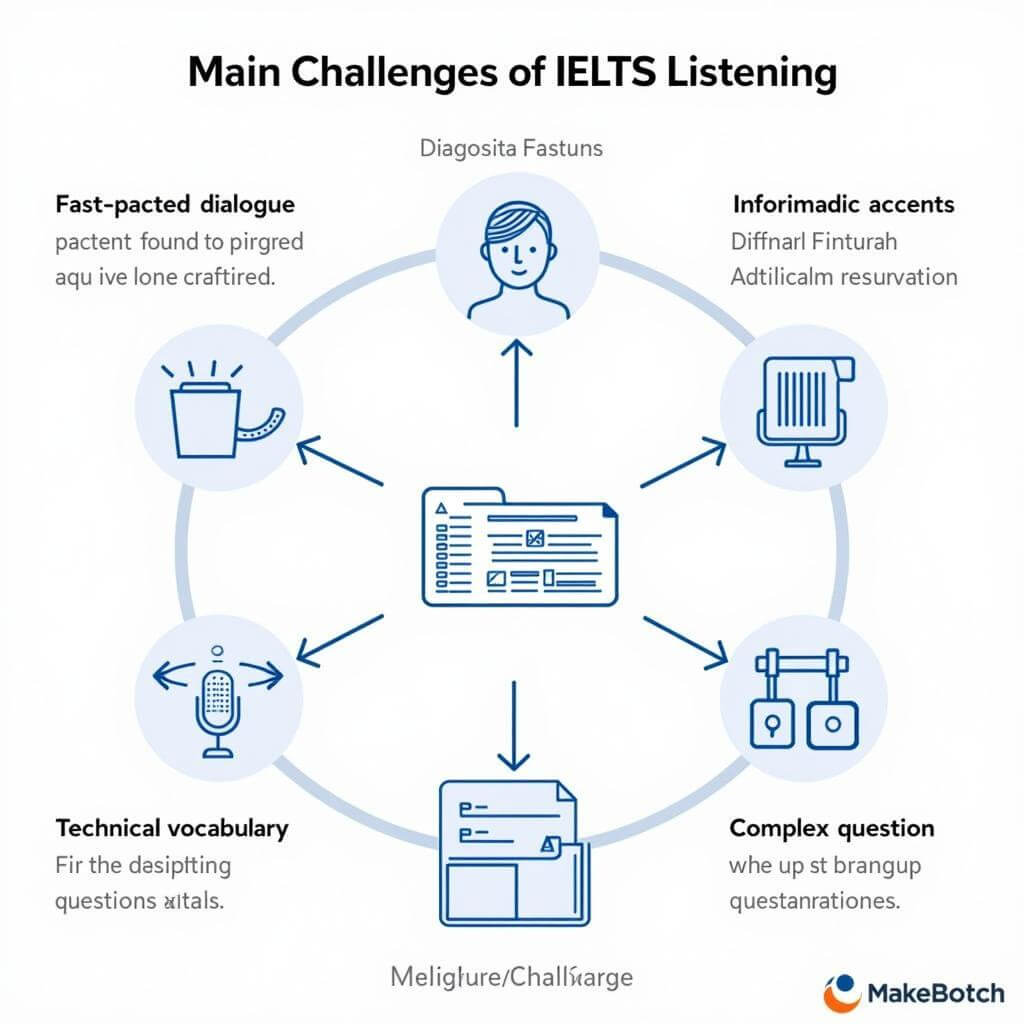The IELTS Listening test can be a formidable challenge, especially when faced with complex sections. This article will guide you through effective strategies to manage difficult IELTS listening sections, helping you boost your score and confidence.
Understanding the Challenges of IELTS Listening
Before diving into strategies, it’s crucial to recognize what makes certain listening sections particularly challenging:
- Fast-paced dialogues
- Unfamiliar accents
- Technical vocabulary
- Distracting background noise
- Complex question formats
By identifying these hurdles, you can better prepare yourself to overcome them.

Strategies for Tackling Difficult Listening Sections
1. Improve Your Focus on Key Information
One of the most crucial skills in managing difficult IELTS listening sections is the ability to focus on key information. Here’s how to sharpen this skill:
- Practice active listening by predicting possible answers before the audio begins
- Pay close attention to signpost words that indicate important information
- Develop strategies for improving focus on key paragraphs to enhance your overall comprehension
2. Enhance Your Vocabulary
A robust vocabulary is essential for tackling difficult listening sections. Consider these tips:
- Study academic and topic-specific vocabulary regularly
- Listen to a variety of English accents through podcasts, news broadcasts, and interviews
- Explore strategies for tackling difficult vocabulary to build your lexical resource
3. Master Time Management
Effective time management is crucial in navigating challenging listening tasks. Here’s how to optimize your approach:
- Read questions quickly before each section starts
- Use the gaps between sections to prepare for upcoming questions
- Learn how to effectively manage time in IELTS listening to maximize your performance
4. Develop Note-Taking Skills
Efficient note-taking can be a game-changer in difficult listening sections. Try these techniques:
- Use abbreviations and symbols to jot down information quickly
- Focus on key words rather than trying to write everything
- Practice summarizing spoken information in short phrases
5. Familiarize Yourself with Different Question Types
IELTS Listening includes various question formats. To manage difficult sections effectively:
- Practice with multiple-choice, matching, and gap-fill questions
- Learn to identify question types quickly
- Develop specific strategies for each question format
“Understanding the nuances of each question type is crucial. It allows you to approach the listening task with a clear strategy, saving time and reducing stress,” says Dr. Emma Thompson, IELTS examiner with 15 years of experience.
6. Tackle Section 4 with Confidence
Section 4 is often considered the most challenging part of the IELTS Listening test. Here’s how to approach it:
- Expect academic content and prepare for complex vocabulary
- Practice listening to academic lectures and presentations
- Implement strategies for tackling IELTS listening section 4 to boost your performance in this crucial part
7. Utilize Practice Tests Effectively
Regular practice is key to improving your performance in difficult listening sections. Follow these tips:
- Use official IELTS practice materials to familiarize yourself with the test format
- Analyze your mistakes after each practice test to identify areas for improvement
- Explore strategies for improving comprehension with practice tests to maximize your learning
Advanced Techniques for Difficult Listening Sections
Once you’ve mastered the basics, consider these advanced strategies:
- Shadow listening: Repeat what you hear in real-time to improve processing speed
- Predict and confirm: Make educated guesses about upcoming information and verify as you listen
- Contextual inference: Use context clues to deduce meanings of unfamiliar words or phrases
“Advanced techniques like shadow listening can significantly enhance your ability to process complex information quickly,” notes Professor James Clarke, a renowned IELTS preparation expert.
Overcoming Common Pitfalls in Difficult Listening Sections
Be aware of these common mistakes and learn how to avoid them:
- Fixating on missed answers and losing focus on subsequent questions
- Misinterpreting similar-sounding words
- Overlooking plural forms or subtle differences in wording
By staying vigilant and practicing regularly, you can overcome these challenges and improve your performance in difficult IELTS listening sections.
Conclusion
Managing difficult IELTS listening sections requires a combination of strategic preparation, focused practice, and advanced techniques. By implementing the strategies outlined in this article, you can approach even the most challenging listening tasks with confidence. Remember, consistent practice and a positive mindset are key to success in the IELTS Listening test.
FAQs
-
How can I improve my concentration during long listening sections?
Practice active listening techniques and gradually increase your listening stamina through regular practice sessions. -
What should I do if I encounter unfamiliar accents in the test?
Expose yourself to various English accents through diverse media sources before the test to build familiarity and adaptability. -
How can I manage my anxiety during difficult listening sections?
Deep breathing exercises and positive self-talk can help calm nerves. Remember, it’s normal for some sections to be challenging for all test-takers. -
Is it better to read questions first or listen to the audio first?
Generally, it’s advisable to read questions first to know what information to listen for, but practice both methods to see which works best for you. -
How can I improve my ability to understand technical vocabulary in listening sections?
Regularly expose yourself to academic content in various fields, and practice note-taking while listening to lectures or podcasts on diverse topics. -
What’s the best way to practice for difficult listening sections at home?
Use official IELTS practice materials, listen to academic podcasts, and watch documentaries with subtitles to check your understanding. -
How important is it to write neatly during the listening test?
While content is most important, legible handwriting ensures that your answers are correctly understood and marked. Practice writing clearly under time pressure.